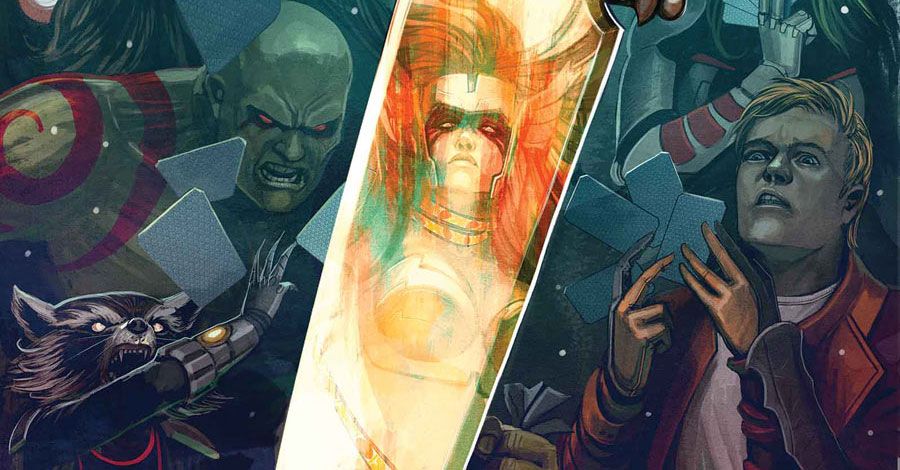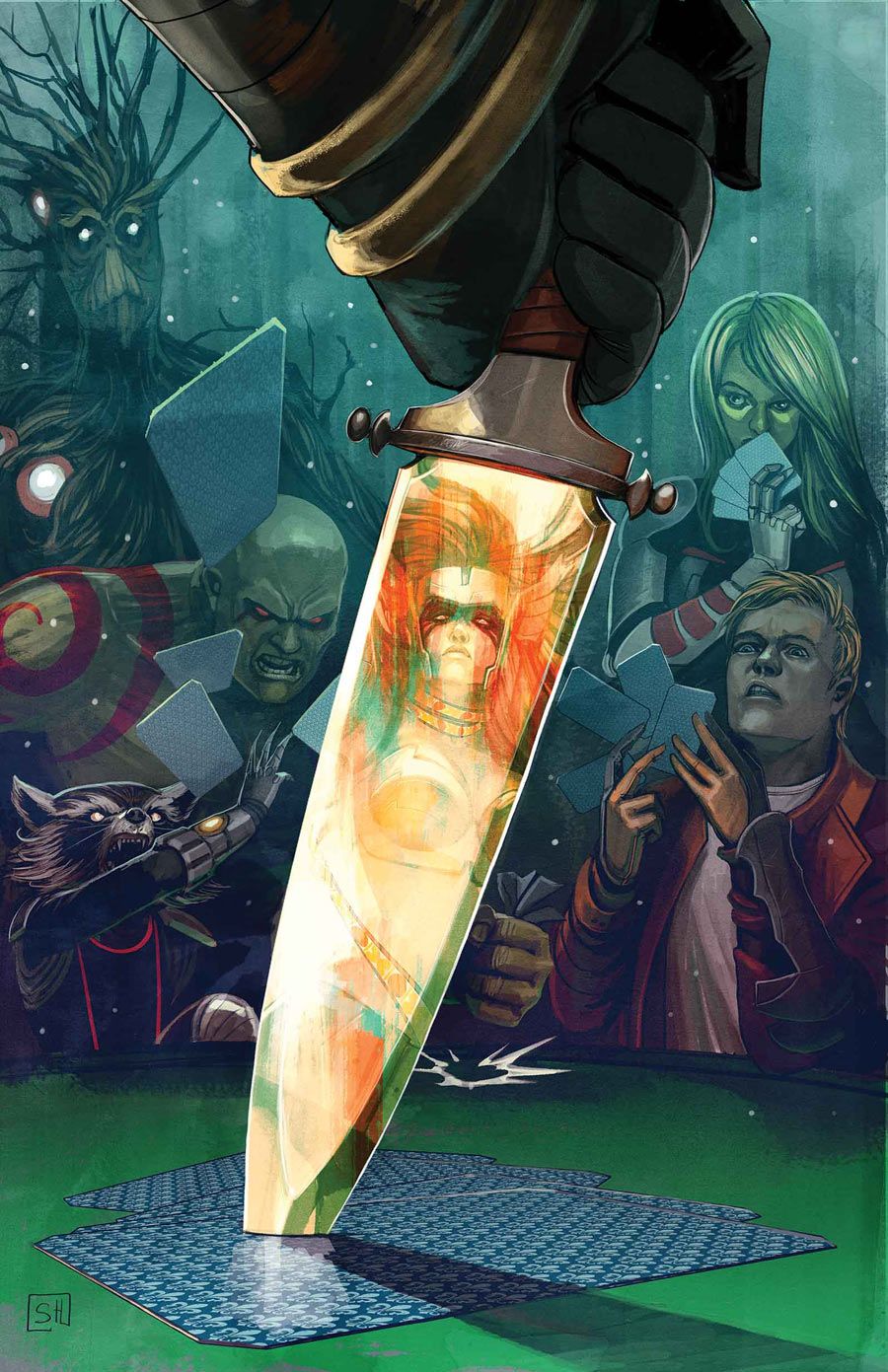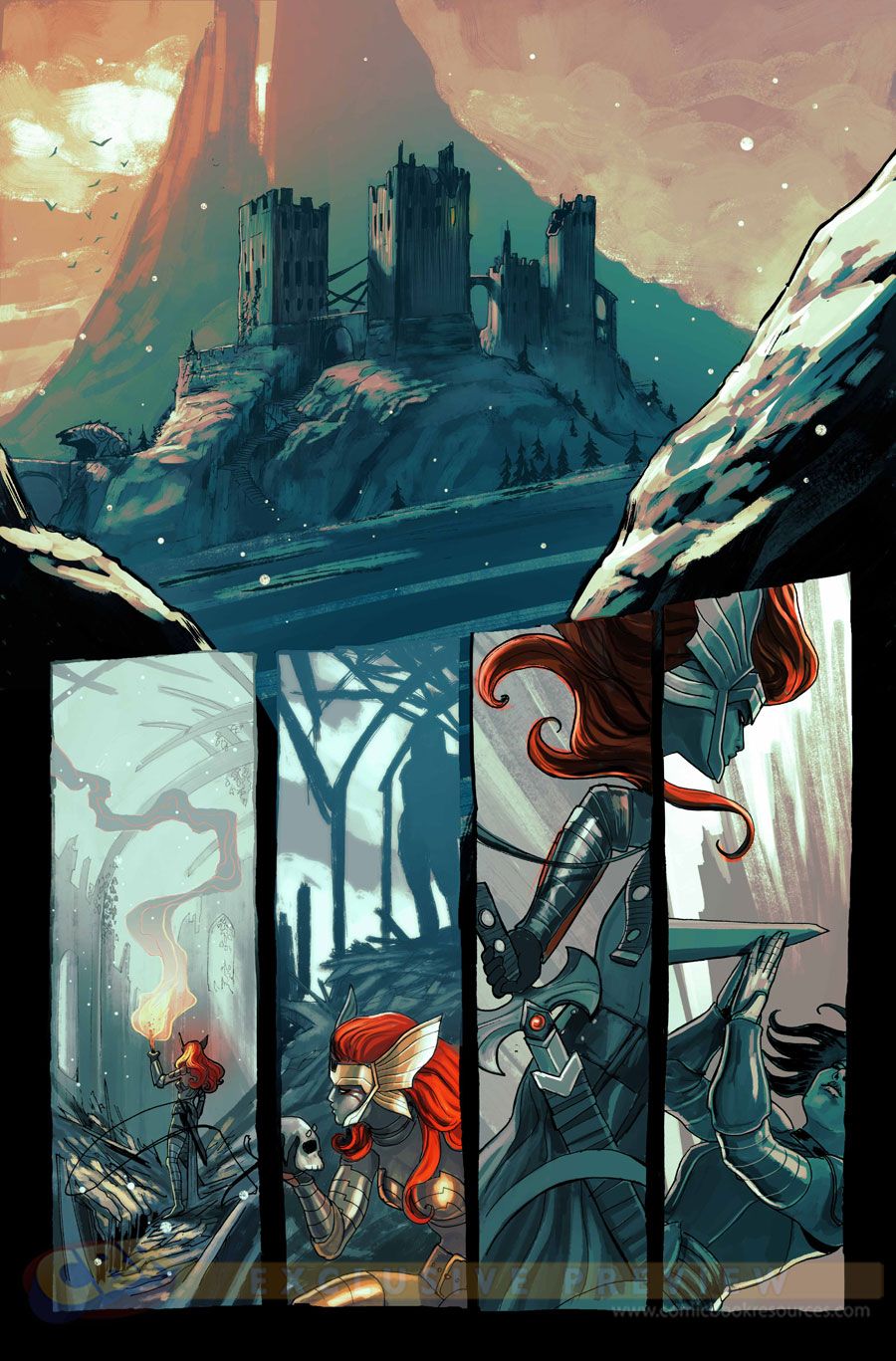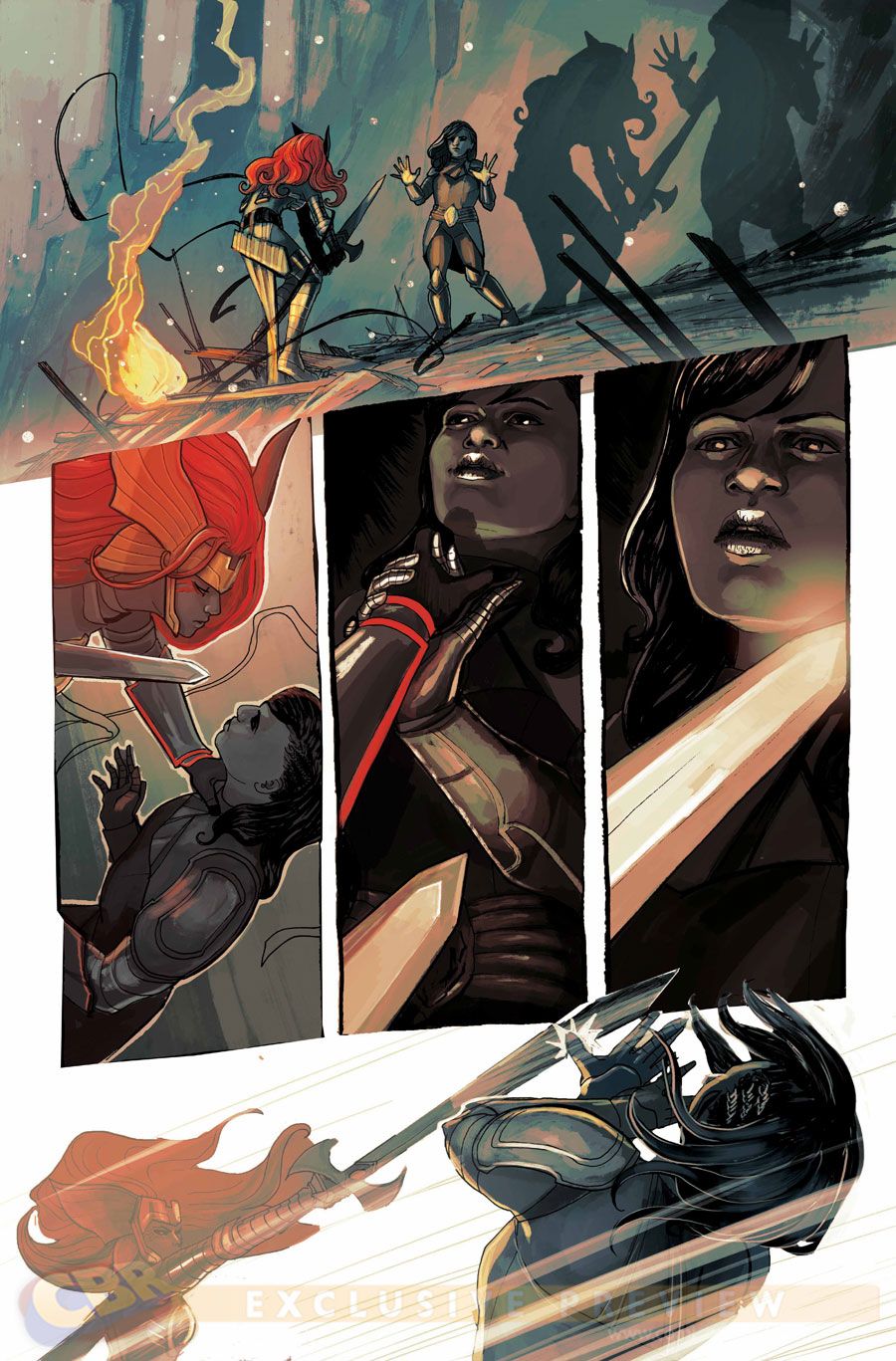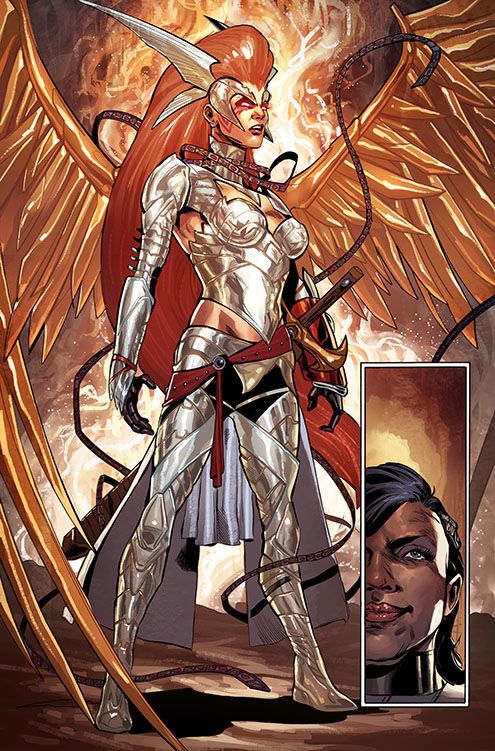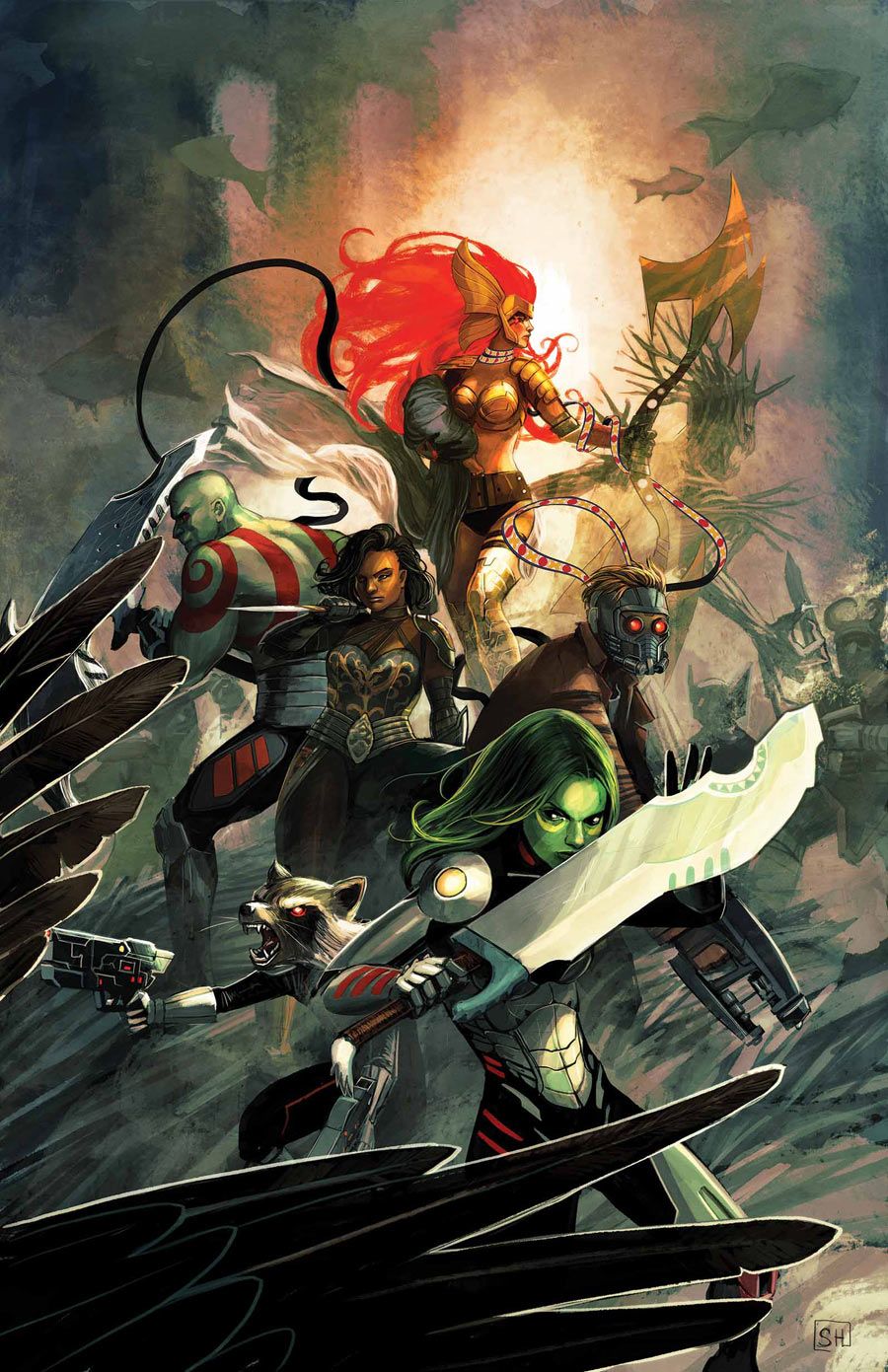Raised as a warrior in the otherworldly dimension of Heven, the secret 10th realm of Asgard, Angela learned to live by a code of balancing scales and obligations. Recently, the balance she craves and lives by was thrown out of alignment by the revelation that she is the daughter of Heven's arch-enemy, the Allfather Odin, King of Asgard.
Now, Angela has her feet in two different realms -- and feels welcome in neither. In Marvel Comics' "Angela: Asgard's Assassin," co-writers Kieron Gillen and Marguerite Bennett and artists Phil Jimenez and Stephanie Hans have sent their title character on a quest to establish her own identity and path in the Marvel Universe.
We spoke with Gillen and Bennett about Angela's new purpose, and how her best friend and traveling companion on that journey, Sera; fits into her goals. The pair discuss crafting both the long and short narratives that run in each issue of the series, and they tease their protagonist's coming encounters with family members like Thor and Loki, along with her former teammates, the Guardians of the Galaxy. Plus, Gillen explains why fans of the book need not concern themselves with the upcoming "Secret Wars," as he and Bennett have crafted their story to take advantage of the event while remaining accessible to those who may choose not to follow it.
CBR News: I wanted to begin by talking about Angela's friend Sera. It feels like you're slowly introducing us to the character, but we do know that she and Angela are pretty good friends. I think that's an interesting phenomenon to happen in a culture as seemingly mercenary as the Angels of Heven. Do the Angels truly grasp the idea of friendship?
Kieron Gillen: That's an interesting philosophical conundrum, isn't it? There's been all this thought about how different fictional cultures, like Klingons or Orcs, don't have our same beliefs. I always thought, "How incredibly iffy is that?" People from different countries and different groups can have shared cultural values, but the execution and individual takes on it differ enormously.
Angela isn't really about the money. She's about the justice, but her concept of justice is about the actual exchange of value in a very abstract sense. Money doesn't interest her in any way, and we haven't really dug into Sera's take on all of this.
One of the key phrases in Angel culture is "nothing for nothing," which seems to be in direct opposition of our culture's understanding of friendship.
Gillen: There is room for different expressions of Angelic cultural values. There's probably a conflict between how they view friendship on a societal level, which I suspect might be a kind of Ayn Randian Objectivist view. That might be a hard philosophy of Angels. There might be some Angels who don't believe in friendship versus other ones who have expressions of friendship perhaps not encouraged by the system.
That's kind of my reading of their system. The more complex readings there are of Angels would be the more interesting one for me.
We can also look at our relationships. We say our concept of friendship is based on altruism, but we can always ask, "Well how much is it really?" [Laughs]
Marguerite Bennett: In issue #3, you will see some illustration of the way the exchange and the balance operates in Angela and Sera's relationship in the past. At times it's serious. At times it's playful. That should help define a little better the kind of relationship the two of them have, even if that's not necessarily meant to be emblematic of their entire culture.
Angela's motivation is justice and balancing things, but does that mean she has a desire to live obligation-free? Does she not want to owe anyone anything?
Gillen: I think the way debt is defined in an ongoing relationship is the thing. Marguerite examines this really well issue #3 when she's looking at the exchange of friendship. Are debts that are paid off the problem? Or is it debts that can never be paid off?
It seems like that idea of debt and owing would definitely impact how Angela views her friendship with Sera.
Gillen: Yeah. It's interesting to be talking about this, because again, it's the kind of stuff Marguerite digs into in her story next issue.
We've talked about the Angel culture that Angela was raised in, but we know she's Asgardian by birth. Is the idea of nature versus nurture something you're interesting in exploring?
Bennett: Yes, very much so [Laughs]
Gillen: Yes, she's a wingless angel. And once again more stuff about that is appearing in issue #3. [Laughs] Angela is working under a stigma that's expressed in Angelic culture in various ways.
Bennett: Even if you're brought into or adopted into a certain culture, ill treatment or social discrimination can mean you're not going to be in a hurry to assimilate in the way that you were intended.
How big a role will Sera play in all of this? Is she pretty much the book's other main character? And will you roll her history out gradually? Or in big chunks?
Bennett: I'm very attached to Sera, but that doesn't guarantee her survival at any point whatsoever. She is very dear to us and I like seeing her on the page.
Gillen: It's funny, me killing off characters is nothing new, and with Sera I killed her off before she even arrived in the comic! [Laughs]
Bennett: [Laughs]
Gillen: We've already said that Angela think she's been dead. So I got ahead of the curve on this one.
We want to get into more of Angela's relationships. Her relationship with the Queen is interesting in a lot of ways. Angela's relationship with the woman who saved her is interesting and something we plan to explore further down the line. We also want to explore Angela's relationship with her Asgardian family: Odin, the All-Mother, Thor, Loki and even the other siblings. I think eventually we do plan on getting to those other siblings as opposed to just the key three.
Bennett: That's really a messed up family tree.
Gillen: Yes, Odin really couldn't keep it in his pants. [Laughs]
Bennett: [Laughs]
Gillen: Sera and Angela really are the heart of the book, though. All these other things are about how she contextualizes herself in the larger Marvel Universe. Sera is ours. She's a character who first appeared in this book, and she hasn't been used anywhere else. Because of that, and many other reasons, she's kind of precious to us.
Bennett: She balances Angela. For a character so obsessed with the scales, this is her equal and opposite.
Right, Sera seems to be able to enjoy the adventures she and Angela have, whereas Angela always seems to have something weighing on her mind.
Bennett: That's fair. If Angela is gravity, Sera is levity.
Gillen: [Laughs] Very good.
In issues #1-2 you embroiled readers in Angela's current mission, the abduction of her sister, Odin and Freya's new born daughter. Am I correct in assuming that she's performing this kidnapping on another's behalf?
Gillen: Her motivations will unfold slowly. What's she's really up to is I think something readers will want to try and figure out. We're dropping more and more clues each issue, and it's clearly something between Sera and Angela. And you might imagine it involves any number of reasons.
Issues #3-4 are really big parts, and issues #5-6 are the climax of this first arc. The recapitulation of Angela's origin is obviously the heart of it. She stole a newly born baby from Asgard, and that's what happened to her.
It felt like the short story in #2, where the Queen of Heven asked Angela to save the Angels, was sort of a glimpse into what's guiding Angela right now.
Gillen: That's a good assumption. Angela's words in that story can be read in various ways, but that's certainly one reading.
Let's talk a little more about the short stories featured in each issue. I would guess writing a comic short story that fits organically into a larger narrative would be incredibly difficult. What's it been like, crafting and coming up with these tales?
Gillen: It's been interesting. It's weird, because I kind of structure the story. Some issues I'll go, "Oh that works!" or, "That's going to be tricky." We do something a bit different in issue #5. I think that's a good way of putting it.
The fact that they were part of the synopsis means when I write it, it's like, "Here's a rough idea of what could happen in the story and what needs to happen. And here's the exposition. Here's the motivation. Go knock yourself out, Marguerite."
Bennett: [Laughs]
Gillen: How tricky do you find it working off what I write?
Bennett: I really enjoy it. I've done a lot of co-writing in my very brief comic career, and this is one of the ones where I feel like I'm allowed to take the reins and contribute fully. Kieron is wonderfully supportive. We discuss the information that we need to convey, and then my role is coming up with a creative and clever way to present that information.
And it's always something interesting. I've never been given the exposition dump. There's never been a dutiful fight scene. I get the chance to be really colorful with it and try to create something in each issue that could stand entirely on its own. Elmore Leonard said, "I tend to not to write the parts of the book that people tend to skip," and I want to make a story like that which is worthy of being drawn by Stephanie [Hans] and worthy of being in "Angela."
How big a role does Stephanie play in designing these short stories? It looks like she has a lot of fun experimenting with things like the layouts.
Bennett: She's amazing! The most pressure I feel, sometimes, is that what I'm writing is not good enough to have her draw it. I have actually scrapped entire substories and started again. [Laughs]
Gillen: Yeah, also Stephanie is a force of nature. You can't really control her. You wouldn't want to. She's someone who has this baroque, beautiful approach to the page. I've only ever really done one story with her, the last issue of my "Journey Into Mystery" run, so I'm very jealous of Marguerite.
You write the script for Stephanie and leave it open for interpretation. I suspect she'd work really well with the Marvel method. I wrote for her in an open way that explained to her what the story was, and she was welcome to have at it in her telling of it. It's quite a thing to see.
Kieron you're also working with a pretty extraordinary artist in Phil Jimenez, who does the main narrative of each issue. It seems like he's having a lot of fun on these initial issues, which are perfectly in his wheel house since they deal with the mythic and fantasy elements of the Marvel U.
Gillen: Phil is amazing. I believe I mentioned in a previous interview that Phil had to be talked into doing the job, is the best way of putting it. And I don't mean that in a capturing his family and threatening to kill them sort of way.
Bennett: [Laughs]
Gillen: He had strong reservations about the character. There was the impression that Angela was a big, grim lady who wants to kill people, and that's not emotionally interesting to him. So I got on the phone with him, and we talked back and forth. He came out the other end of this hour-long conversation, getting the character. The conversation also made me get the character in other ways, because I have no desire to write her as a character that's a grim Punisher type figure, either.
I think our conversation comes out in the book, because when I see the pages, it's clear that Phil is both a writer and a storyteller himself. When I saw his first issue, I changed the way I did paneling. For most artists I've never worked with, I tend to write a four or five-panel page. I know with Phil, though, that he'll take those pages and turn them into nine-panel pages and I know that when I really need a nine-panel page, I can call for one, and it will look good. I also know that Phil will look at a page like that, and move it in a different way. He takes the story and tells the story.
He also got to design a new costume for Angela in the next issue. There was a lot of back and forth about that, and it was a lot of fun. It's completely different from everyone else's costume reworking at the moment. We're not really working with the kind of, "I'm going to take a selfie"-style character.
Bennett: [Laughs]
Gillen: Our character is more, "I'm on stage and I'm going to play guitar with David Bowie." She's pure glam-metal.
It looks like Phil will soon be able to stretch his sci-fi muscles, since the Guardians of the Galaxy will be making a guest appearance.
Bennett: They are!
Gillen: They are? [Laughs] Yes. It was a lot of fun, because I've never written them before, which is always a good reason for me to do anything. One of the projects I'm doing during "Secret Wars" involves all of my favorite characters, plus a few I haven't had a chance to write yet. [Laughs] And the Guardians are a lot of fun.
Part of the structure of the first story is that we go around the Marvel Universe. Issue #1 is literally Limbo. It's no place. There's not many moving parts. In issue #2, we show a bit of Asgard politics. Then we show Earth. So you get some scenes of what Angela would be like on Earth. In issue #3, we go deep into Asgard, so we'll have the high fantasy and all the real Asgardian stuff. Then, in issue #4, Angela is in space because she's also this cosmic character who's adventured with the Guardians. We get to see her in all different sorts of places, and that illuminates her many different fragments. It shows the flexibility of the character and also, by implication, what the stories we do next will be like.
Bennett: She gets further defined the farther we take her out of the depths where readers have known her.
The post-"AXIS" Loki and Thor popped up in "Angela" #2, and it looks like they'll have larger roles in the series moving forward. What's it like writing those characters?
Gillen: It's funny writing Loki again to be honest. [Laughs] Of course, you have haven't got a chance to write either of them yet.
Bennett: Nope!
Gillen: I do believe you get a chance to write Thor in issue #5, though. We have to be quite cagey about the specifics of that.
Bennett: [Laughs] Cross my heart.
Gillen: It's weird, because what Al [Ewing] is doing with Thor and Loki in "Loki: Agent of Asgard" is astounding. I can't believe he's doing what he is, as well as he's doing it. He deserves an award for continuity-based writing.
This story happens before what Al is currently doing. So it's like the last time you get to see Loki and Thor on an adventure together. And Thor is really pissed off. His status quo is more based around the fallout of "Original Sin" than "AXIS." In the "Angela" book, I'm digging into that aftermath from "Original Sin." He hasn't quite got a handle on how to deal with Angela and now that he's unworthy he's not depressed, but he's sullen. He's bearing the weight of it, but there is a sense of a rage underneath it all.
Bennett: The Odinson is in a very bad place, and what is occurring now, with the kidnapping of his little sister, is sending him somewhere even darker. There's a line in I believe the fifth script that almost made me recoil when I read it. "Kieron! Oh my gosh! That's so upsetting." It is really effective, though [Laughs]
Gillen: It's funny putting a line that hard in Thor's mouth.
Bennett: Yeah! But it was so effective because of that. I think I put my hands over my mouth and leaned back from my computer. [Laughs]
Gillen: I think [Editor] Wil [Moss] said the same thing when that was in the outline that was sent in. It's always good when a character surprises you. It's like, "I can't believe you went there, dude."
We know the end of the Marvel Universe is imminent because of "Secret Wars." What kind of impact will "Secret Wars" have on "Angela?" Will it be an immediate one come May, or do you still have more story to tell before "Secret Wars" impacts your book?
Gillen: We probably can't talk about what we're doing in "Secret Wars" itself. We kind of swap places, though. Marguerite is going to be writing the main story and I'm going to be writing the five-page stories. So we're literally swapping chairs and that's kind of the fun of it. I want to have a go at what she did. [Laughs]
"Secret Wars" fundamentally changes things a lot, and it's a really interesting chance to play with stuff. That's probably the best way of putting it. We kind of leave the first arc in this really big place, then the second arc explores a different aspect. We kind of bring them together in the third arc, in whatever follows "Secret Wars."
Is there anything else I'm missing that I can say?
Bennett: No. I've lived too long under the specter of "you run your mouth, you lose your job," and if you haven't guessed, I really, really like this project. [Laughs]
Gillen: I've done the crossover dance a lot. We knew that the second arc of this book would be involved in "Secret Wars." We planned for it as such. "Journey Into Mystery's" first eight issues were all tie-ins to "Fear Itself," and that was the start of what was like a 31-issue novel. So this is something we are used to doing; making a story that is interesting and integrates the book into the larger story. I've had experience doing that on "Uncanny X-Men," "Journey Into Mystery" and "Thor." I'm pretty confident we can pull this off.
Some readers may be worried because it feels like, right as "Angela: Asgard's Assassin" is starting, the larger table of the Marvel Universe is being swept clear.
Gillen: I completely get the fear, but this is nothing we didn't know. When you take on a job, the worst thing, as a writer, is when the job changes. If you're aware of what the boundaries are when you accept the job, you can plan for it. Even if it's a hard thing to do, you it's not a surprise, because you took on the job knowing all that. You could have turned down the job if you didn't think you could do it.
In the case of "Angela," we knew the change was coming, we planned for it, and the story we want to tell has a purpose. "Secret Wars" doesn't derail our story. It's part of the building blocks. It's a valley that we move our story through.
Like I said before, every issue of "Journey Into Mystery" was designed to dovetail every issue of "Fear Itself." If you gave me free rein, that's not how I would have started a 31-issue novel in the Marvel Universe, but knowing that was what the position was, I knew I could do it.
I always understand trepidation about crossovers because I'm the most cynical person in the world. There's a tendency for people to complain about crossovers that come out of nowhere, but this is something that Jonathan Hickman has been working towards ever since Marvel NOW! It's like a hundred issues of comics, plus stuff from other books and stuff that's been foreshadowed all over the place. This is a really beautiful and intricately planned event. It's something you could only really do in a shared universe like this. I understand people who are worried about it shaking up other books, but this is a very cool thing to try to do.
Plus, I've read the scripts and they're good! [Laughs] It's really Jonathan Hickman doing a major Marvel event. It's very much him, playing on an enormous stage. It's fascinating.
Bennett: If you love "Angela," or you're just learning to like "Angela," or you care about Sera and the book, follow us into the crossover. We'll take care of you. We'll make it accessible. We'll make it fun. We'll make it really wild and weird. So no worries.
Gillen: That's the other thing we've sort of planned this as a good jumping on point. So if you want to jump on as we begin the crossover. It's a great place to jump on as well. We're very modular and we're trying to be welcoming. We're very nice basically. Me and Marguerite are very nice people.
Bennett: [Laughs] We are! We won't let you get killed by the horrible monsters.

Gillen: We definitely won't poison your drink in our inn...

